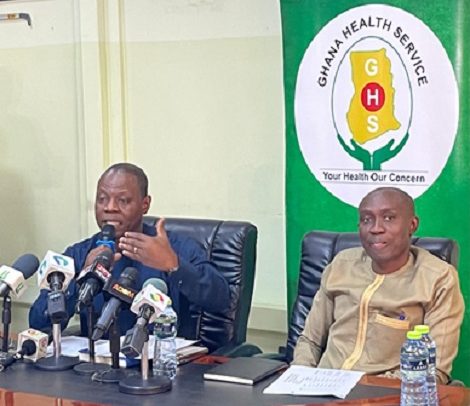Dr. Patrick Kuma-Aboagye with Director of Public Health, Dr. Franklin Asiedu Bekoe
The Ghana Health Service (GHS) is scheduled to start the Mass Drug Administration (MDA) for Lymphatic Filariasis and Onchocerciasis from tomorrow, July 16 to 26, 2024.
GHS Director General, Dr. Patrick Kuma-Aboagye, speaking at a media briefing in Accra said the exercise would be conducted in 77 Oncho-endemic districts across the country to reach 5.8 million people and three lymphatic filariasis-endemic districts in three regions to reach 440,000 people who are at risk.
He explained that these diseases are Neglected Tropical Diseases (NTDs) commonly found in poor communities that causes one to be disfigured and disabled, keeping children out of school and parents out of work.
According to him, human onchocerciasis mostly known as ‘River Blindness’ is a disease of the skin and eye caused by onchocerca volvulus (a parasitic worm transmitted by simulium species “blackflies” that breed in fast-flowing rivers and streams).
“Although considerable progress has been made in the control of onchocerciasis, there is still an enormous task ahead to achieve the global target elimination by 2030,” he mentioned.
He revealed that the main strategy for control and combating of onchocerciasis is the interruption of transmission through the annual MDA using the Community-Directed Treatment strategy.
Dr. Kuma-Aboagye emphasising the Lymphatic Filariasis commonly known as elephantiasis, said it occurs when filarial parasites are transmitted to humans through infected mosquitoes, and acquired in childhood causing hidden damage to the lymphatic system.
“The painful disfiguring of the disease, lymphoedema, elephantiasis and scrotal swelling occur later in life and these patients are not only physically disabled, but suffer mental, social and financial losses leading to stigma and poverty,” he noted
“Lymphatic filariasis is endemic in 116 districts in Ghana and currently, the transmission of the infection has been interrupted in 109 districts,” he revealed.
According to him, preventing and controlling NTDs is central to ending extreme poverty, and the MDA provides a single dose of medication to all eligible individuals twice or once a year.
He showed his sincere gratitude to the health workers for their dedication to eliminate NTDs and thus urged all stakeholders to contribute in fighting against these diseases.
By Janet Odei Amponsah


